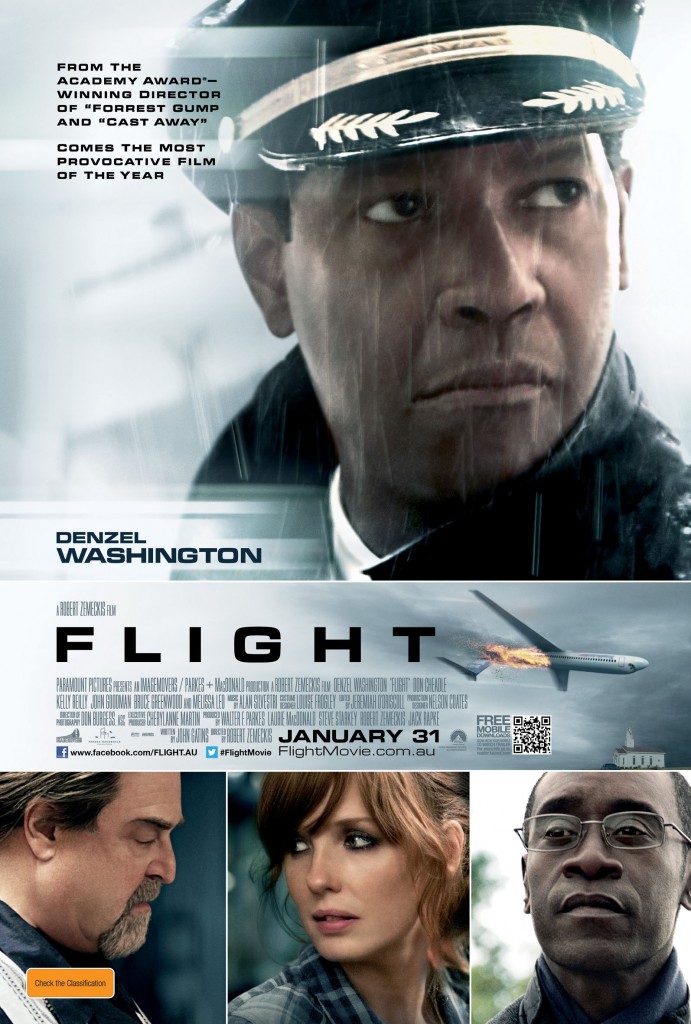
Flight
Studio: ImageMovers and Parkes/MacDonald Productions
Publisher: Paramount Pictures
Format: Cinema
Release Date: January 31, 2013
Overview
Loosely based on real-life events, Flight is Robert Zemeckis’ return to live-action cinema after a string of successful animated works. It has been receiving critical acclaim, particularly in the ‘lead actor’ and ‘best screenplay’ categories for Denzel Washington and John Gatins respectively, both of whom have been nominated for multiple awards, including the coveted Academy Award. It’s a drama that looks at addiction, conviction and morals. But does Flight sustain a steady altitude throughout it’s 138 minute runtime?…
Story
William “Whip” Whitaker is a middle-aged SouthJet Airlines pilot who is divorced, sleeping with his fellow crew member – a flight attendant named Katerina Marquez (Nadine Velazquez) – and is a functioning alcoholic. Oh, and a drug user. So much so that he snorts a line of coke almost immediately after waking to pick himself up from a hangover. It’s definitely not going to stop him from doing his job though, as he gets dressed and boards for Flight 227 to Atlanta, Georgia.
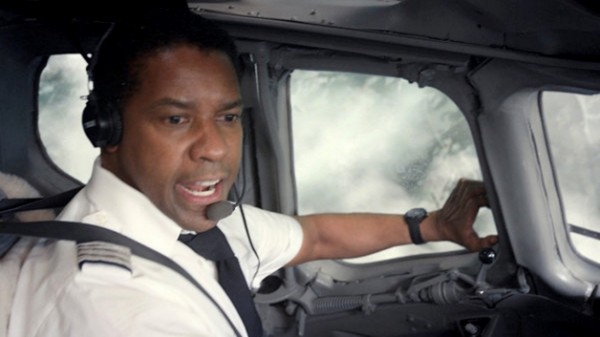
He and the crew begin another routine day, which seemingly includes Whitaker dumping three mini-vodka bottles into his orange juice. However, a storm is brewing overhead. Whitaker buckles himself in next to a new face – Ken Evans (Brian Geraghty), his young co-pilot. After a very turbulent take-off where Whitaker takes command in “threading the needle” through the storm clouds, a sigh of relief is exclaimed by all…but, things soon go horribly wrong. Suddenly, the elevator blows and gets stuck in a downward position with the controls consequently dying.
Whitaker proceeds to expertly and calmly instruct his newly acquainted co-pilot in helping him invert the plane in order to level out. After doing so, the two co-operate in turning right side up again for the inevitable crash landing. The idea of inverting an airliner may seem ludicrous, but it was attempted, and apparently achieved by a real life pilot, the story of that fateful flight being the inspiration for that particular plot point/scene in Flight. He, unfortunately, was not successful in landing the plane safely. Nonetheless, it’s a spectacle to see it occur on screen.
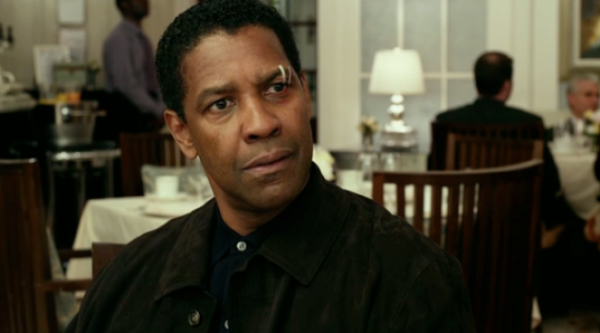
Whitaker awakens in a Southern Atalanta hospital to news coverage of the event on the in-room TV. He turns his head to see good friend and SouthJet Airlines’ Pilot Union representative Charlie Anderson waiting on him to awake. Anderson calls in a few National Transportation Safety Board (NTSB) officials who ask a few questions of Whitaker before alerting him to the fact that there were 6 deaths out of the 102 passengers – 2 of which were crew. One of them being Katerina.
Whitaker soon meets a heroin addict named Nicole (Kelly Reilly), who is recovering from an overdose, having a smoke in the stairwell. It’s from this point on that their lives becomes intertwined. It’s quite interesting how addicts always seem to find each other. Wanting to avoid all of the media outlets and reporters, Whitaker gets his buddy and dealer, Harling Mays (John Goodman), to drive him to his Father’s empty farm. Goodman was introduced in an earlier hospital scene, and I couldn’t help but be reminded of The Big Lebowski after witnessing his performance here. He is the comic relief of the film, which is needed for the film to refrain from becoming flat-out depressing.
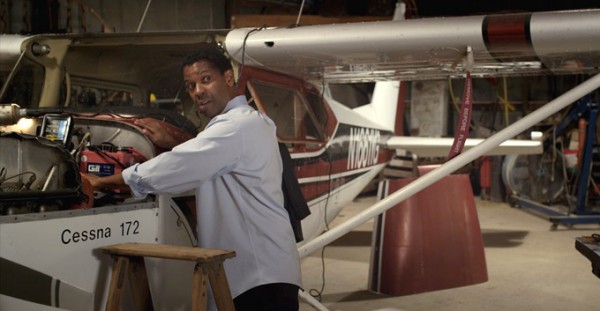
Whitaker pours out all the alcohol in the farmhouse before settling in. Charlie soon contacts him and sets up a lunch meeting with Hugh Lang (Don Cheadle), a criminal lawyer, who explains that the NTSB acquired a toxicology screen test result that was administered while he was unconscious. It states that he was intoxicated during the flight. This is the key piece of information that I must stop at so as to not spoil the finer details of the film (yes, that was all just the set up). This revelation has a big effect on his psyche, and naturally triggers some rash emotions.
Of course, questions arise about the true reason for the crash. Was Whitaker being in an inebriated state to blame? Was it truly a fault with the plane? I will say that prior to watching the screening, I was under the impression that the film would be more ambiguous about the truth, with the potential mystery being the focus of the film. But it is actually very clear cut to the viewer. It’s mostly a story-telling device used to be a catalyst for a great character study, which involves looking at morals and faith as much as it does taking responsibility.
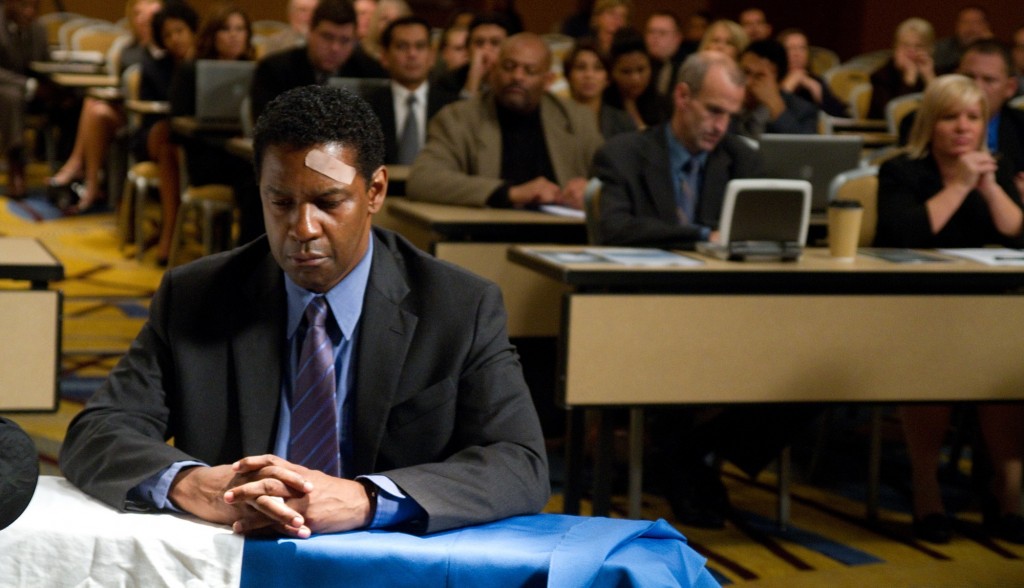
Kelly Reilly does an impressive job as the hopelessly drug-addicted Nicole. Denzel Washington also (as you’ve probably ascertained) does an amazing job here. It is one of the very best performances of his long and remarkable career. He’s also a very realistic and believable drunk, although I don’t necessarily know if that’s a compliment…In all seriousness, actors always speak on how hard it is to play a convincing drunk. I can see others being concerned with the possible interpretation that drug use is being trivialised by Whitaker using cocaine as a positive, such as to get himself straightened out. I, however, understood it’s purposes within the context of the film.
Visuals
Flight is a well-shot film, but being a drama, you’re not going to see much in the way of flashy, exciting visuals. Outside of the turbulent cockpit/cabin scenes and the subsequent nosedive, upside down aerials and crash, the film is, for the majority, a steady and consistent visual experience. Speaking of that plane sequence, the naturally claustrophobic space of the cockpit along with the constant camera-shaking and comparatively quick editing really relay how dire the situation is.
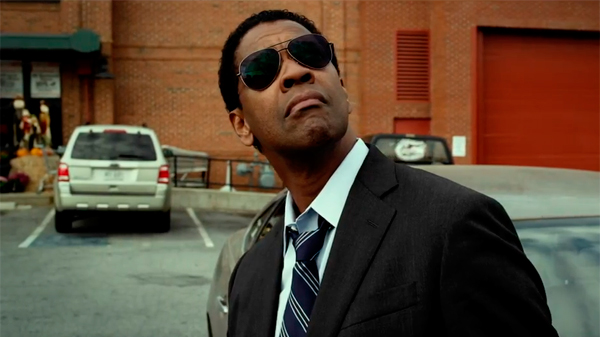
That scene was as arresting as it could be, and with the plane’s wing slicing through a church tower, it simultaneously set up the proceeding plot and metaphorically reiterated a major theme of the film, which is religion or faith. It may not have been the most deft of executions, but it spoke volumes nonetheless. One camera technique/shot I particularly loved was one very early on in Whitaker’s hotel, where he rolls over in his bed to face his bedside table, which has a line of cocaine neatly manicured. The camera, handheld, is placed across from him on the far end of the table/line. As he snorts it and moves closer to the camera, we track forward into him, creating a feeling of acceleration.
Audio
The soundtrack to Flight is a mix of licensed tracks along with some harrowing piano pieces from Alan Silvestri. The piano plays during the sadder scenes, but also at the very beginning of the film until the opening shot comes in, which really foreshadows what the tone of the film, overall, will be. “Opening” as it’s titled on the official score, is a simple ascending two-note, played across various octaves, that hits you in your core with it’s harmonious, yet strangely non-uplifting sound – which becomes a consistent musical motif/theme for Whitaker.
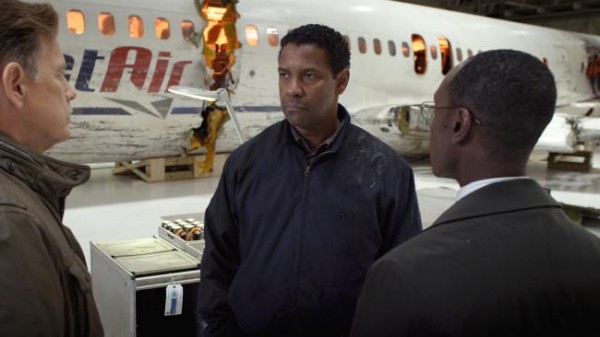
The rest of the score is equally as effective and affecting, while the licensed tracks bring a more upbeat atmosphere to the few light and humorous scenes, with “Gimme Shelter” by The Rolling Stones and “Feelin’ Alright” by Joe Crocker being particularly well-suited for those moments. “Feelin’ Alright” was actually being sung by Whitaker under his breath in the cockpit and also played during the end credits, so it’s as much a musical motif as the solo piano.
Overall
There’s no doubt that without such a magnetic actor as Denzel Washington to carry the performance of Whip Whitaker, Flight would have never seen its own take-off. It’s a testament to how natural and believable a thespian he is as I found myself engaged from start to finish, enthralled by this character study. But not all the praise should be sent Denzel’s way; Robert Zemeckis has truly made a great return to live-action films here. Also, despite taking some liberties in presenting certain real-to-life details (such as the fact that a drunk, drug-abusing pilot in the modern age wouldn’t be able to keep his license with all the random drug-testing) John Gatins does deserve the 4 nominations he has received for the screenplay.
That being said, the religious overtones at times felt like a heavy-handed representation of the American belief system, but it did have it’s place in the story. Hell, if you saw a plane flying past you, inverted, and only 6 civilians died in the resulting crash, you’d probably believe in God and divine intervention too. If you can suspend your disbelief somewhat, Flight doesn’t take a nosedive, but instead soars high. Let’s not judge cinema too seriously. Flight is a great start to 2013 for dramatic cinema. I suggest you check-in at your local cinema come January 31st!


